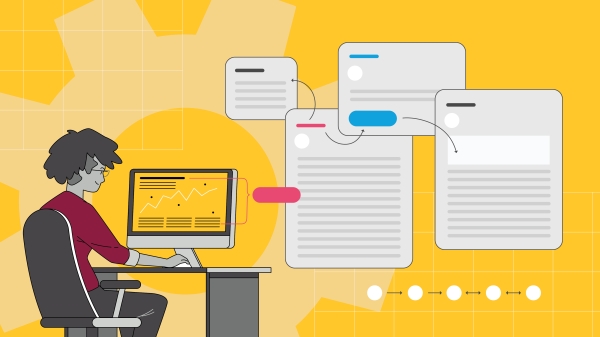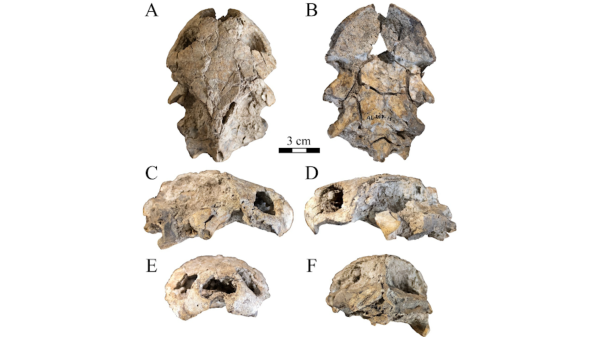Editor's note: This story is part of a series of profiles of notable spring 2022 graduates.
Although Lauren Hardy was almost always the top math student every year in her elementary, junior high and high schools, mathematics was not the first subject she considered to major in during college. While attending high school in Mesa, Arizona, she exceeded the amount of math classes offered by the district and alternatively attended Mesa Community College to continue taking math classes during her senior year. After having an excellent teacher for her AP Calculus BC class, she realized not only was she good at math, but she really enjoyed it.
“From that moment on, I knew I would major in something that used math, I just wasn’t sure yet what that would be,” said Hardy.
Originally entering Arizona State University as an exploratory STEM major, she wanted to do math and possibly some type of engineering. In one of her English classes, the final project was to write about any topic, so Hardy looked into government security and stumbled upon cryptography. She soon realized it was right at the intersection of math and computer science, the two majors she was considering.
“I also noticed that ASU had a certificate in cryptology. It just sounded really cool and used math, so I was all in,” said Hardy.
For her Barrett, The Honors College thesis and creative project, Hardy created an encrypted Battleship game.
As one of the top students in mathematics, she was selected to attend the Jonathan D. and Helen Wexler Mathematical Sciences Junior Dinner hosted at the University Club.
Last May, she earned a Bachelor of Science in computational mathematics with a certificate in cryptology, the perfect combination of mathematics and computer science.
She continued at ASU as part of the 4+1 program, and this spring graduated with a Master of Arts in mathematics from the School of Mathematical and Statistical Sciences, part of The College of Liberal Arts and Sciences.
Hardy will be relocating to Bedford, Massachusetts, to pursue her career as a cyber security engineer for the MITRE Corporation. As a not-for-profit organization, MITRE works in the public interest across federal, state and local governments, as well as industry and academia, in areas as varied as artificial intelligence, intuitive data science, quantum information science, health informatics, space security, policy and economic expertise, cyber threat sharing and cyber resilience.
On LinkedIn, Hardy had seen several internship opportunities posted by MITRE. She applied for the data science internship, thinking she would not get the cybersecurity one since that was not her major. Then her resume got passed on to the cyber department, which invited her for an interview. She went through a three-hour technical interview, divided into cryptography, programming and cyber security. The team of interviewers were most interested to learn about Hardy’s thinking process. Shortly after the interview, she was offered the cyber security internship.
She interned with the company last summer and has stayed with them since, accepting a full-time offer in September. She works on protocol design and development and programs some of the post-quantum crypto algorithms in Cryptol, a coding language made specifically for cryptography.
Associate Professor Nancy Childress led Hardy’s master’s committee and also served as her undergraduate thesis adviser.
“Cryptology is a great fit for Lauren — she has expertise in the theoretical underpinnings behind the cryptosystems, and also in the practical issues surrounding implementation. She seems equally capable and enthusiastic in both aspects of the subject, as her honors thesis project and her internship demonstrate. She has good ideas, is not intimidated by complex concepts and energetically meets whatever challenges come her way. I really enjoyed working with her — and I'm excited to see where her talents take her in her career,” said Childress.
Hardy faced many challenges during her childhood. Her parents divorced when she was in fourth grade. She grew up in essentially a single parent household, seeing her father every other weekend. Her mother was physically disabled, and also had cancer when Hardy was 6 years old. Having insurance was a necessity.
“The only way my mom could get insurance after the divorce was from the government, and to keep government insurance – which was kind of the only option available – we had to remain poor,” said Hardy. “Fortunately, ASU offered me a full-ride Obama Scholarship, covering not only tuition, but room and board, too, so the decision to attend was easy.”
As a young woman majoring in mathematics, Hardy is part of a historically underserved group in the mathematics community. She experienced a few classes at ASU where she was the only woman in the room.
“In some ways, it’s intimidating,” said Hardy. ”However, most of the time I think it empowers me more – I know I am good at it and can stand my ground against any man in any of my classes. I work hard and do quite well.”
We asked Hardy to share more about her experiences as a Sun Devil.
Question: What do you like most about mathematics (and your area of concentration)?
Answer: I love how math makes sense of the world. There is so much order and beauty hidden all throughout the universe, and math allows us to uncover more and more. I specialize in cryptography, and I love how it's the intersection of math and computers, and how applicable it is to almost everything we do technology-wise (even if very few know it).
Q: What is something you learned while at ASU — in the classroom or otherwise — that surprised you, that changed your perspective?
A: It is easy to look back and see all that I have accomplished. But, as I have been reflecting these last few days, I’ve learned it’s not all me. I have had an amazing support system throughout these last four years that has brought me joy and laughter in the midst of all the school stress. I have learned that there are many people who love me and support me and root for me.
Q: Do you feel your education at ASU prepared you well to move forward with your career?
A: Yes. Very few know the math side of cybersecurity. Not many schools have a math-based cryptography class like ASU does.
Q: Which professor taught you the most important lesson while at ASU?
A: Nancy Childress has taught me many lessons throughout the years. She has been my instructor for about six or seven classes, and she’s been my undergrad thesis director and my master’s committee leader.
Q: What is the best piece of advice you would give to those still in school?
A: Make sure you are majoring in what you love. You have to pick something that you enjoy so much so that even when you really hate it, there is still a small part of you that finds joy in it. College isn’t easy and there will be classes you have to take that you will hate, but choosing the right major for you definitely helps.
Q: What do you think is most misunderstood about math by the general public?
A: That it is just calculus, algebra or geometry. There is so much more.
Q: What was your favorite spot on campus, whether for studying, meeting friends or just thinking about life?
A: The grassy area behind the graduate college building. It tends to have less people and be shaded.
Q: What do you like to do in your spare time for fun?
A: Board games, puzzles, cooking, hanging out with friends.
Q: If someone gave you $40 million to solve one problem on our planet, what would you tackle?
A: Hmm, I would probably have to do a lot of research to determine the best possible solution. But as of this moment, I would probably say improving the government-run systems that provide help and support to those who need it.
More Science and technology

New research by ASU paleoanthropologists: 2 ancient human ancestors were neighbors
In 2009, scientists found eight bones from the foot of an ancient human ancestor within layers of million-year-old sediment in…

When facts aren’t enough
In the age of viral headlines and endless scrolling, misinformation travels faster than the truth. Even careful readers can be…

Scientists discover new turtle that lived alongside 'Lucy' species
Shell pieces and a rare skull of a 3-million-year-old freshwater turtle are providing scientists at Arizona State University with…


